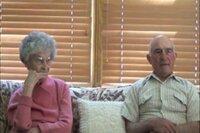| Title |
Papageorge, Harry; Kogianes, Mary OH16_013 |
| Creator |
Weber State University, Stewart Library: Oral History Program |
| Contributors |
Papageorge, Harry, Interviewee; Kogianes, Mary, Interviewee; Rands, Lorrie, Interviewer; Whitney, Brian, Interviewer |
| Collection Name |
Immigrants at the Crossroads-Ogden City Oral Histories |
| Description |
Immigrants at the Crossroads - Ogden City is a project to collect oral histories, photographs and artifacts related to the immigrant populations that helped shape the cultural and economic climate of Ogden. This project will expand the contributions made by Ogden's immigrant populations: the Dutch, Italian and Greek immigrants who came to work on the railroad and the Japanese who arrived after World War II from the West Coast and from internment camps. |
| Abstract |
The following includes the transcript and a video clip from an oral history interview with Harry Papageorge and Mary Kogianes. |
| Subject |
Immigration; Greek |
| Digital Publisher |
Stewart Library, Weber State University, Ogden, Utah, USA |
| Date |
2015 |
| Date Digital |
2017 |
| Temporal Coverage |
1892; 1893; 1894; 1895; 1896; 1897; 1898; 1899; 1900; 1901; 1902; 1903; 1904; 1905; 1906; 1907; 1908; 1909; 1910; 1911; 1912; 1913; 1914; 1915; 1916; 1917; 1918; 1919; 1920; 1921; 1922; 1923; 1924; 1925; 1926; 1927; 1928; 1929; 1930; 1931; 1932; 1933; 1934; 1935; 1936; 1937; 1938; 1939; 1940; 1941; 1942; 1943; 1944; 1945; 1946; 1947; 1948; 1949; 1950; 1951; 1952; 1953; 1954; 1955; 1956; 1957; 1958; 1959; 1960; 1961; 1962; 1963; 1964; 1965; 1966; 1967; 1968; 1969; 1970; 1971; 1972; 1973; 1974; 1975; 1976; 1977; 1978; 1979; 1980; 1981; 1982; 1983; 1984; 1985; 1986; 1987; 1988; 1989; 1990; 1991; 1992; 1993; 1994; 1995; 1996; 1997; 1998; 1999; 2000; 2001; 2002; 2003; 2004; 2005; 2006; 2007; 2008; 2009; 2010; 2011; 2012; 2013; 2014; 2015 |
| Item Size |
39p.; 29cm.; 2 bound transcripts; 4 file folders. 1 video disc: digital; 4 3/4 in. |
| Medium |
oral histories (literary genre) |
| Spatial Coverage |
Ogden, Weber County, Utah, United States, http://sws.geonames.org/11788968, 41.22809, -111.96766 |
| Type |
Text; Image/MovingImage |
| Conversion Specifications |
Filmed using a Sony HDR-CX430V digital video camera. Sound was recorded with a Sony ECM-AW3(T) bluetooth microphone. Transcribed using WAVpedal 5 Copyrighted by The Programmers' Consortium Inc. Digitally reformatted using Adobe Acrobat Xl Pro. |
| Language |
eng |
| Rights |
Materials may be used for non-profit and educational purposes; please credit University Archives, Stewart Library, Weber State University. |
| Source |
Papageorge, Harry; Kogianes, Mary OH16_013; Weber State University, Stewart Library, University Archives |
| Format |
application/pdf; video/mp4 |
| ARK |
ark:/87278/s6tm09k1 |
| Setname |
wsu_webda_oh |
| ID |
104215 |
| Reference URL |
https://digital.weber.edu/ark:/87278/s6tm09k1 |
| Title |
Papageorge, Harry; Kogianes, Mary OH16_013 |
| Creator |
Weber State University, Stewart Library: Oral History Program |
| Contributors |
Papageorge, Harry, Interviewee; Kogianes, Mary, Interviewee; Rands, Lorrie, Interviewer; Whitney, Brian, Interviewer |
| Description |
Immigrants at the Crossroads - Ogden City is a project to collect oral histories, photographs and artifacts related to the immigrant populations that helped shape the cultural and economic climate of Ogden. This project will expand the contributions made by Ogden's immigrant populations: the Dutch, Italian and Greek immigrants who came to work on the railroad and the Japanese who arrived after World War II from the West Coast and from internment camps. |
| Biographical/Historical Note |
This is an oral history interview with Harry Papageorge and Mary Kogianes, conducted by Lorrie Rands and Brian Whitney on March 25, 2015. Harry and Mary, children of Greek immigrants, share their parents story and discuss the family's Greek heritage. In the 1920s, the family owned a store in Ogden, then later moved to become farmers in Weber County. |
| Subject |
Ogden (Utah); Immigration; Greek |
| Digital Publisher |
Stewart Library, Weber State University, Ogden, Utah, USA |
| Date |
2015 |
| Date Digital |
2017 |
| Temporal Coverage |
1892-2015 |
| Item Size |
39p.; 29cm.; 2 bound transcripts; 4 file folders. 1 video disc: digital; 4 3/4 in. |
| Medium |
oral histories (literary genre) |
| Spatial Coverage |
Ogden, Weber County, Utah, United States, http://sws.geonames.org/11788968, 41.22809, -111.96766 |
| Type |
Text; Image/MovingImage |
| Conversion Specifications |
Filmed using a Sony HDR-CX430V digital video camera. Sound was recorded with a Sony ECM-AW3(T) bluetooth microphone. Transcribed using WAVpedal 5 Copyrighted by The Programmers' Consortium Inc. Digitally reformatted using Adobe Acrobat Xl Pro. |
| Language |
eng |
| Rights |
Materials may be used for non-profit and educational purposes; please credit University Archives, Stewart Library, Weber State University. |
| Source |
Papageorge, Harry; Kogianes, Mary OH16_013; Weber State University, Stewart Library, University Archives |
| Format |
application/pdf |
| Setname |
wsu_webda_oh |
| ID |
104411 |
| Reference URL |
https://digital.weber.edu/ark:/87278/s6tm09k1/104411 |





